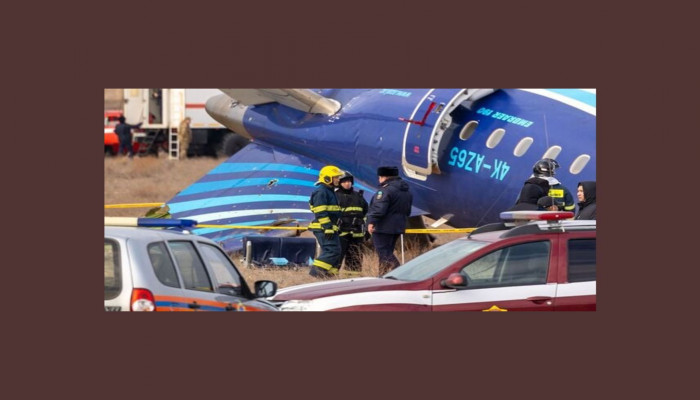‘External physical and technical interference’ caused plane crash in Kazakhstan: Azerbaijan Airlines
- In Reports
- 10:29 PM, Dec 27, 2024
- Myind Staff
Azerbaijan Airlines has attributed the tragic crash of its Embraer 190 aircraft in Kazakhstan, which claimed 38 lives, to “external physical and technical interference.” The flight, carrying 67 passengers, was en route from Baku to Grozny in Russia’s Chechnya on Christmas Day when it encountered adverse conditions that led to its diversion and eventual crash in Aktau, Kazakhstan.
The airline stated that the aircraft was “denied landing due to fog” in Grozny and was redirected over the Caspian Sea. The crash occurred in an open field in Aktau, resulting in 38 fatalities, with 29 passengers surviving.
Latest reports suggest the involvement of a Russian surface-to-air missile as a potential cause of the crash. It is alleged that a missile was “accidentally fired” at the aircraft, forcing it off course and leading to its crash. The Kremlin has denied these claims and issued warnings against such speculation.
A pro-government Azerbaijani website, Caliber, citing unnamed officials, reported that a missile from a Pantsir-S air defence system might have downed the plane. Supporting this theory, videos from the crash site revealed evidence of shrapnel damage and holes in the aircraft’s nose. Military and aviation experts, as reported in international outlets such as The Wall Street Journal, Euronews, and AFP, highlighted these observations as indicative of missile interference.
Flight J28243, operated by Azerbaijan Airlines, serves the route between Baku and Grozny. Grozny, a city in Russia’s Chechnya, has been a recent target of Ukrainian drones and is heavily guarded by anti-aircraft defence systems, including surface-to-air missiles.
Investigations into the crash are ongoing as authorities examine the potential causes and assess the reported evidence of missile involvement.
Azerbaijan Airlines has stated that “external physical and technical interference” was the cause of the tragic plane crash in Kazakhstan, which resulted in the deaths of 38 people out of the 67 on board.
FlightRadar24, an online flight tracking website, reported that the Azerbaijan Airlines aircraft experienced strong GPS jamming prior to the crash, though the specific cause of the interference was not disclosed. The flight struggled to maintain a consistent altitude for about an hour, with its vertical speed data graph indicating a steady altitude followed by a sudden drop and fluctuations in height before the crash occurred.
In light of the ongoing investigation and safety concerns, Azerbaijan Airlines announced on Friday that it would suspend flights to several Russian airports, citing potential flight safety risks.
A passenger told Reuters that there was at least one loud bang as it approached Grozny. “I thought the plane was going to fall apart,” Subhonkul Rakhimov, one of the passengers, told Reuters from the hospital, adding that he had begun to recite prayers and prepare for the end after hearing the bang.
After the loud bang, the plane had acted strangely as if it was drunk, Rakhimov said. “It was as if it was drunk – not the same plane anymore,” he said.
While Russia says the investigation is underway, Reuters reported quoting four sources that Russian air defences had mistakenly shot it down.
Rosaviatsia, Russia’s aviation watchdog, stated that the captain of the Azerbaijan Airlines flight had been offered alternative airports to land at but chose to divert to Aktau in Kazakhstan, as reported by Reuters.
The damage to the aircraft has drawn comparisons to the 2014 downing of Malaysia Airlines Flight MH17, which was shot down by a Russian-backed missile system, the Buk 9M38, while flying over eastern Ukraine’s Donetsk Oblast. In that tragic incident, all 283 passengers and 15 crew members aboard the Boeing 777 were killed.







Comments